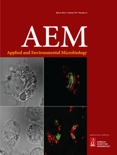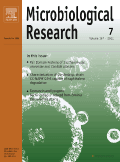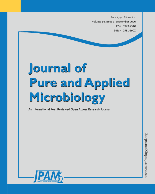
APPLIED AND ENVIRONMENTAL MICROBIOLOGY
Scope & Guideline
Exploring Microbial Innovations for a Sustainable Future
Introduction
Aims and Scopes
- Microbial Ecology and Diversity:
Research on the composition, diversity, and functions of microbial communities in various environments, including soil, water, and extreme habitats, highlighting their ecological roles and interactions. - Biotechnology and Industrial Applications:
Studies that explore the use of microorganisms for biotechnological applications, including enzyme production, bioremediation, and fermentation processes. - Pathogen Interactions and Antimicrobial Resistance:
Investigations into the mechanisms of pathogenicity, host-pathogen interactions, and the emergence of antimicrobial resistance in bacteria and fungi. - Metagenomics and Systems Biology:
Utilization of metagenomic and genomic approaches to understand microbial functions, metabolic pathways, and community dynamics in environmental samples. - Microbial Biogeochemistry:
Research focusing on the biochemical processes mediated by microorganisms in nutrient cycling, including carbon, nitrogen, and sulfur cycles, particularly in relation to environmental changes. - Synthetic Biology and Genetic Engineering:
Studies that involve engineering microbial systems for enhanced production of bioactive compounds, biopolymers, or for environmental applications.
Trending and Emerging
- Microbiome Research:
There is an increasing focus on the human and environmental microbiomes, investigating their roles in health, disease, and ecosystem functioning, including studies on the gut microbiota and its implications for host health. - Biotechnological Innovations:
Emerging themes centered around the engineering of microorganisms for industrial applications, such as the production of biofuels, bioplastics, and pharmaceuticals, are gaining significant traction. - Phage Therapy and Antimicrobial Alternatives:
Research exploring bacteriophage applications as alternatives to antibiotics is on the rise, reflecting growing concerns over antibiotic resistance and the search for sustainable therapeutic options. - Climate Change Impacts on Microbial Function:
Studies examining how climate change affects microbial communities and biogeochemical cycles are increasingly prominent, addressing critical environmental issues. - Synthetic Biology Applications in Microbial Systems:
There is a growing trend in the application of synthetic biology to create microbial strains with enhanced capabilities for biotechnological processes, including metabolic engineering for compound synthesis.
Declining or Waning
- Traditional Microbial Taxonomy:
There is a noticeable decline in studies primarily focused on classical microbial taxonomy without integration of molecular techniques, as more researchers adopt molecular methods for species identification and characterization. - Environmental Monitoring of Water Quality:
Research specifically dedicated to water quality monitoring, particularly using traditional microbial indicators, has decreased as newer, more efficient molecular techniques and broader ecological assessments gain traction. - Single-Organism Studies:
There is a shift away from studies focusing on individual microbial species in isolation, towards research that emphasizes interactions within complex communities or ecosystems, reflecting a more holistic understanding of microbial ecology. - Static Laboratory Studies:
Research that relies heavily on static laboratory conditions without considering dynamic environmental factors is becoming less common, as there is a growing emphasis on in situ studies that reflect real-world complexities.
Similar Journals

ARCHIVES OF MICROBIOLOGY
Empowering Researchers with Cutting-Edge MicrobiologyThe Archives of Microbiology, published by Springer, is a reputable journal in the field of microbiology, serving as a vital platform for the dissemination of groundbreaking research and critical reviews since its inception in 1974. With an ISSN of 0302-8933 and an E-ISSN of 1432-072X, this journal operates out of Germany and maintains a global reach, promoting high-quality scholarship across multiple disciplines, including biochemistry, genetics, and molecular biology, as evidenced by its Q2 ranking in Medicine (miscellaneous) and consistent Q3 placements in other categories in 2023. Although the journal does not offer open access options, its rigorous peer-review process ensures that published articles are of the highest standard, making it an essential resource for researchers, professionals, and students keen on advancing their understanding of microbial sciences. As the journal converges toward 2024, it remains committed to fostering innovative microbiological research and facilitating interdisciplinary dialogue within the scientific community.

MICROBIOLOGY
Illuminating the Interconnectedness of Microbial LifeMICROBIOLOGY (ISSN: 0026-2617, E-ISSN: 1608-3237), published by MAIK NAUKA/INTERPERIODICA/SPRINGER, is a pivotal journal in the field of microbiological research, operating from the vibrant hub of New York, United States. With a focus on the intricate relationships and functionalities of microorganisms, MICROBIOLOGY serves as an essential resource for professionals and researchers dedicated to advancing the knowledge of applied microbiology and biotechnology. As of 2023, it holds a competitive Q3 and Q4 category ranking in Applied Microbiology and Biotechnology and Microbiology, respectively, reflecting its commitment to high-quality and impactful research. Although currently not open access, the journal extends comprehensive insights into critical topics that span environmental microbiology, clinical applications, and biotechnology advancements, making it a vital platform for disseminating innovative findings in this ever-evolving discipline. Researchers and students alike will find MICROBIOLOGY to be an invaluable addition to their academic and professional repertoire.

APPLIED BIOCHEMISTRY AND MICROBIOLOGY
Innovating Research at the Intersection of Life Sciences.Applied Biochemistry and Microbiology is an esteemed journal published by Pleiades Publishing Inc, focusing on the intricate intersections of biochemistry and microbiology. Established in 1970, with a commitment to advancing scientific knowledge, this journal serves as a vital platform for disseminating innovative research findings in applied microbiology, biotechnology, and biochemistry. With its ISSN 0003-6838 and E-ISSN 1608-3024, the journal operates from its base in New York, USA. As a recognized publication in the field, Applied Biochemistry and Microbiology holds a Category Quartile ranking of Q3 in Applied Microbiology and Biotechnology and Q4 in Biochemistry, reflecting its significant contributions and relevance. Although currently not open access, the journal is indexed in Scopus, with respectable rankings that highlight its impact in the community, making it a pivotal resource for researchers and professionals dedicated to the realms of biochemistry and microbiology.

AMB Express
Unleashing Knowledge for Tomorrow's Biotechnological BreakthroughsAMB Express is an esteemed open-access journal published by Springer, dedicated to the fields of Applied Microbiology and Biotechnology as well as Biophysics. Since its inception in 2011, the journal has played a pivotal role in disseminating cutting-edge research and advancements, particularly for the scientific community in Germany and beyond. With a notable impact factor and ranking in the top quartile of its categories, AMB Express is recognized for its contributions to the disciplines, ranking 29th in Biochemistry, Genetics and Molecular Biology and 37th in Applied Microbiology and Biotechnology, reflecting its commitment to high-quality scientific inquiry. Researchers, professionals, and students will find a wealth of knowledge within its pages, benefiting from a diverse array of articles that stimulate innovation and collaboration. As the journal continues its convergence from 2011 to 2024, it remains a vital source for anybody looking to stay at the forefront of microbiological and biotechnological studies.

CANADIAN JOURNAL OF MICROBIOLOGY
Exploring the Frontiers of MicrobiologyThe Canadian Journal of Microbiology, published by Canadian Science Publishing, is a well-respected journal established in 1954 that serves as a vital platform for advancing knowledge in the fields of microbiology and related disciplines. With an ISSN of 0008-4166 and an E-ISSN of 1480-3275, this journal is recognized for its rigorous peer-review process and its commitment to disseminating high-quality research that spans applied microbiology, biotechnology, genetics, immunology, and more. Currently indexed in several prestigious databases, its impact factor and category quartiles highlight its significance, ranking in the top tiers of applied microbiology and biotechnology as well as other intersecting fields. The journal provides an essential resource for researchers, professionals, and students seeking to stay informed on the latest advancements and breakthroughs, facilitating collaboration and innovation in the microbiological sciences. Set in the dynamic landscape of academia from its headquarters in Ottawa, Canada, the Canadian Journal of Microbiology remains steadfast in its mission to promote research that addresses key challenges and opportunities within the microbiological community.

ANNALS OF MICROBIOLOGY
Connecting researchers to the pulse of microbiology.ANNALS OF MICROBIOLOGY is a prestigious journal dedicated to advancing the field of microbiological research, published by BMC, renowned for its commitment to providing open access to vital scientific findings. With its ISSN 1590-4261 and E-ISSN 1869-2044, this journal provides a platform for the dissemination of high-quality research since its inception in 1997. Renowned for its rigorous peer-review process, it has attained a commendable Q2 ranking in the Applied Microbiology and Biotechnology category in 2023, reflecting its significant contributions to the discipline. Positioned within the 67th percentile among its peers in Scopus rankings, ANNALS OF MICROBIOLOGY continues to facilitate the exchange of innovative ideas and methodologies, serving as an essential resource for researchers, professionals, and students alike. The journal covers a broad spectrum of topics, emphasizing the intersection of microbiology with applied sciences, thereby fostering an environment that encourages collaboration and advancement in this vital field. Scholars seeking to stay at the forefront of microbiological studies will find ANNALS OF MICROBIOLOGY an invaluable addition to their academic pursuits.

APPLIED MICROBIOLOGY AND BIOTECHNOLOGY
Empowering discoveries that shape our world.Applied Microbiology and Biotechnology, an esteemed journal published by Springer, serves as a vital resource in the domains of microbiology and biotechnology. With an impressive impact factor reflecting its quality, the journal holds Q1 rankings in various categories including Applied Microbiology and Biotechnology, Biotechnology, and Medicine (Miscellaneous) as of 2023. Spanning the years from 1984 to 2024, it underscores its commitment to disseminating groundbreaking research that addresses pressing challenges in health, agriculture, and environmental sustainability. The journal is rigorously indexed and holds respectable positions in Scopus rankings, notably within the top 15% of Applied Microbiology and Biotechnology and the top 15% in Biochemistry, Genetics, and Molecular Biology. Although it is not Open Access, its comprehensive articles, reviews, and short communications are indispensable for researchers, professionals, and students eager to advance their understanding and application of microbial processes and biotechnological innovations in real-world contexts.

MICROBIOLOGICAL RESEARCH
Elevating Knowledge in Microbiology and ImmunologyMICROBIOLOGICAL RESEARCH, published by Elsevier GmbH, serves as a leading platform for advancements in the field of Microbiology, holding an impressive Q1 ranking in its category as of 2023. With an ISSN of 0944-5013 and E-ISSN 1618-0623, this journal has been instrumental in disseminating high-quality research since its inception in 1994 and continues to contribute significantly to the academic landscape through 2024. Positioned within the top 13% of publications in the Immunology and Microbiology category, ranked #24 out of 182 according to Scopus, it attracts the attention of researchers, professionals, and students alike. While the journal is not open access, it offers vital insights and peer-reviewed articles that drive innovation and exploration within microbiological research. Its rigorous selection process underscores the importance of quality and relevance in advancing knowledge in this dynamic field.

WORLD JOURNAL OF MICROBIOLOGY & BIOTECHNOLOGY
Exploring Breakthroughs in Microbial and Biotechnological ResearchWORLD JOURNAL OF MICROBIOLOGY & BIOTECHNOLOGY, published by Springer, serves as a pivotal forum for advancing the fields of microbiology and biotechnology since its inception in 1990. Located in the Netherlands, this esteemed journal has secured a prominent position in the academic landscape, recognized for its strong impact factor and prestigious Q2 category rankings across disciplines such as Applied Microbiology, Biotechnology, and Physiological Sciences. Researchers and professionals utilize this journal to disseminate innovative findings and explore emerging technologies that are transforming the scientific landscape. With a robust submission rate and high visibility among the academic community, the journal fosters interdisciplinary collaboration, encouraging discussions that bridge gaps between theory and practical applications. As it converges into 2024, the WORLD JOURNAL OF MICROBIOLOGY & BIOTECHNOLOGY continues to be a vital resource for scholars aiming to enhance our understanding of microbial processes and biotechnological advances.

Journal of Pure and Applied Microbiology
Empowering Science with Open Access Microbial InsightsJournal of Pure and Applied Microbiology, published by DR M N KHAN, is an esteemed Open Access journal that has been dedicated to advancing the frontiers of microbiological research since its inception in 2007. Located in Bhopal, Madhya Pradesh, India, this journal presents a platform for researchers and professionals in the fields of Applied Microbiology and Biotechnology, offering insights that span a diverse range of topics critical to both scientific progress and industrial applications. As of 2023, the journal is categorized in the Q3 and Q4 quartiles, demonstrating its relevance and growing impact within the community—ranking #219 in Biochemistry, Genetics and Molecular Biology and #93 in Immunology and Microbiology. With an emphasis on accessibility, the journal has embraced an Open Access format since 2017, allowing for a wider dissemination of knowledge. By publishing high-quality research, the Journal of Pure and Applied Microbiology plays a pivotal role in fostering innovation and collaboration among researchers, students, and industry professionals alike.